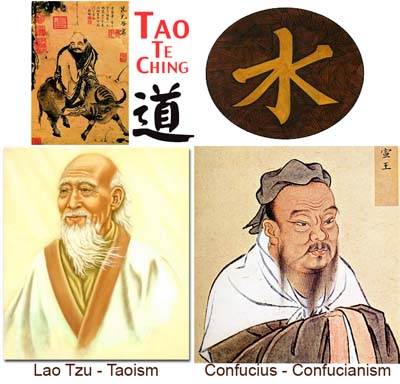Lao Tzu (or Tsu), founder of Taoism
Lao Tzu, famed founder of Taoism taught that all beings are part of the whole, no one species is special and that our physical being is not the whole. The root of all things is the infinite, all-powerful; or we are all connected to one great power. The way to harmony and peace is within, through meditation to remove desire. The main concept of his teachings is non-action, meaning acceptance of our karma and of God’s will, and meditating to achieve nothingness, or complete mindfulness.
|
Name: |
Lao Tzu |
|
Birth, Age, Death: |
6th century BC |
|
Nationality: |
Chinese |
|
Method/Religion started: |
Founder of Taoism |
|
Holy book/teachings: |
Tao Te Ching |
|
Followers: |
220+ Million |
|
Lifestyle requirements: |
Simple life, vegetarian |
|
Form of practice: |
meditation, Taoists are known to be very powerful due to their focused minds and highly advanced practice. |
|
Wiki (encyclopedia) link: |
http://en.wikipedia.org/wiki/Lao_Tsu |
- When a wise person hears Tao, he practices it diligently.
- When an average person hears Tao, he practices it sometimes, and just as often ignores it.
- When an inferior person hears Tao, he roars with laughter.
- If he didn’t laugh, it wouldn’t be Tao.
Thus the age-old saying:
- The way to illumination appears dark.
- The way that advances appears to retreat.
- The way that is easy appears to be hard.
- The highest virtue appears empty.
- The purest goodness appears soiled.
- The most profound creativity appears fallow
- The strongest power appears weak.
- The most genuine seems unreal.
- The greatest space has no corners.
- The largest talent matures slowly.
- The highest voice can’t be heard.
- The most luminous image can’t be seen.
- Tao is hidden and has no name.
- Tao alone nourishes and fulfills all things.
Confucius, founder of Confucianism
What was unique about Confucius’ ideals was his attempt to include strong morality into many accepted ideas, beliefs, and social customs – his method was practical, a way of life in harmony with each other. Meditation came a little later, using a quiet inward method to help strengthen their ideals and ability to live in the world. This is slightly different to other methods which teach to escape the world, go beyond it. Confucianism is more of a philosophy or way or life than religion, so a person can be of any religion and still follow the teachings of Confucius
|
Name: |
Confucius |
|
Birth, Age, Death: |
551-479 BC |
|
Nationality: |
Chinese |
|
Method/Religion started: |
Founder of Confucianism |
|
Holy book/teachings: |
Four Books and Five Classics including Analects |
|
Followers: |
300+ Million |
|
Lifestyle requirements: |
Strict morality, love thy neighbour |
|
Form of practice: |
Put the masters teachings into daily life |
|
Wiki (encyclopedia) link: |
http://en.wikipedia.org/wiki/Confucius |
Confucius had many wonderful teachings. For example he taught people they should “internalize” their issues before they manifest them physically and by doing that the behavior will be more controlled.
A famous quote from Confucius which we have all heard (and often thought it was Christian) was “Do not do to others what you do not want done to yourself”

